#U.S. Department of Labor
Explore tagged Tumblr posts
Text
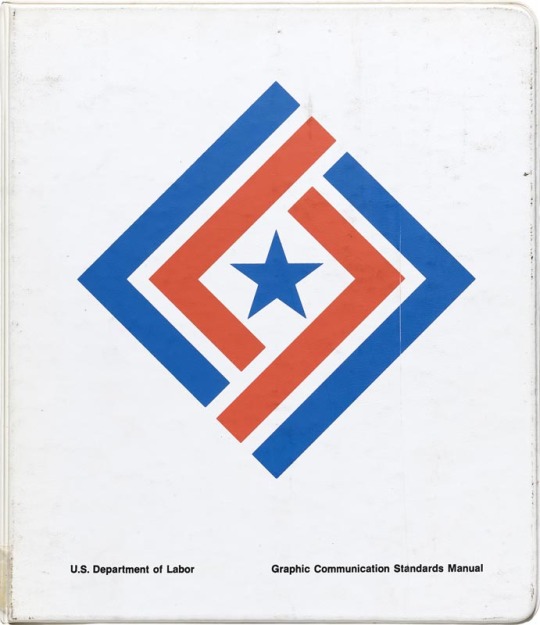
U.S. Department of Labor Graphic Communication Standards Manual, 1974.
Designer: John Massey
#graphic design#manual#John Massey#U.S. Department of Labor#Graphic Communication Standards Manual#USA#1974
54 notes
·
View notes
Text
3 notes
·
View notes
Text

Let's take a moment on this Workers' Day to recognize the important role that workers play in shaping our society and economy. Your labor makes a difference, and we appreciate all that you do. Keep up the great work
Here is something for everyone CLICK HERE
#labour#labor#labor day#happy may day#happy labour day#major tom#labour movement#i stand with laour#i stand#1st may#1er mai#u.s. department of labor#local union#wages
5 notes
·
View notes
Text
You Are Sponsoring a Foreign National Employee for Permanent Residency, Can You Clawback Some of the Fees?
Companies usually hire a foreign national who requires visa sponsorship because they cannot find a U.S. worker with those skill sets, which is frequently in the STEM fields. However, visa sponsorship comes with significant costs to the employer. Employers may be able to recover a portion of the immigration sponsorship fees by implementing what are called “clawback” provisions into their…
#Clawback provisions#DOL#Foreign Nationals#green card#H-1B petition#PERM#sponsorship fees#STEM#U.S. Citizenship & Immigration Services#U.S. Department of Labor#USCIS#visa sponsorship
0 notes
Text
CTO: Engineering
Duke University
Design: Wayne State University
$18,000: January 2023 - July 2024
- Slavery -
Michigan Department of Attorney General
Vice President Kamala Harris
U.S. Department of Education
U.S. Department of State
U.S. Department of Labor




1 note
·
View note
Video
Farm to Win "Over There" by Library Company of Philadelphia Via Flickr: World War I-era poster places the image of a boy plowing over a battle in the background to recruit young men to join the U.S. Boys' Working Reserve, "the army behind the army." Published by the U.S. Department of Labor; artist: Adolph Treidler, ca. 1917-1919. Accession Number: P.2284.239 Click here to view the record of this poster on ImPAC, the Library Company's digital collections catalog.
#World War I#U.S. Department of Labor#recruitment poster#U.S. Boys' Working Reserve#The Army behind the Army#plow#Library Company of Philadelphia#flickr
0 notes
Video
youtube
The Story of OSHA (1980) Documentary
#youtube#Osha#osha approved#labor#labor rights#u.s. department of labor#FLSA#Work#workplace#marvelous movies
0 notes
Text
Trump got absolutely dumpstered in court in the last few days.
His and Elon's program to pay people to retire early has been halted by a temporary restraining order issued by District Judge George A. O’Toole Jr. of the US District Court, District of Massachusetts in American Federation of Government Employees et al v. Charles Ezell (acting Acting Director of the Office of Personnel Management). This temporary order only lasts until they have a hearing on Monday to determine whether this program is constitutional.
13 state attorneys general sued to prevent Elon from accessing personal data about government employees and citizen clients of their agencies, leading to Judge Colleen Kollar-Kotelly in the case Alliance for Retired Americans v. Scott Bessent (Trump's Secretary of the Treasury) ordering the Department of Justice to ensure no unauthorized persons, including Elon and his team, have access to the Labor Department's database of information on tax filings, employment, and the like.
Two separate judges have ruled that Trump's executive order trying to eliminate birthright citizenship under the 14th Amendment is unconstitutional. U.S. District Judge John Coughenour of the western Washington district, a REAGAN appointee (!), said, "It has become ever more apparent that to our president the rule of law is but an impediment to his policy goals. The rule of law is, according to him, something to navigate around or simply ignore, whether that be for political or personal gain." The other judge, US District Judge Deborah Boardman of Maryland, ruled that the executive order cannot be implemented until she has had a chance to rule on the merits of the case.
US District Court Judge Royce C. Lamberth in DC paused Trump’s restrictions on transgender women being incarcerated in women’s prisons and federal prisons providing gender-affirming medical treatment, after inmates (!) sued to block the policy.
US District Judge Loren L. Alikhan of DC broadly blocked the Trump administration’s memo halting almost all federal assistance.
That's six rulings scrapping five of Trump's major policy operations in the past four days (Feb 3rd through the 6th, 2025).
That's news worth celebrating!
#politics#us politics#trump#american politics#uspol#resistance#judicial resistance#the courts#law and order
12K notes
·
View notes
Text
Minnesota Will Suffer from a Crackdown on U.S. Immigration
Today “Minnesota is home to about 480,000 foreign-born residents, comprising about 8.5% of the population, according to the state Department of Employment and Economic Development (DEED). Those residents tend to be younger than Minnesota’s native-born population, and most are in their prime working years, filling jobs from agriculture to education to health care. Between 2011 and 2021, immigrants…
View On WordPress
#Minnesota Department of Employment and Economic Development#State of Minnesota labor market#Susan Brower (Minnesota State Demographer)#U.S. fertility rate#U.S. immigration
0 notes
Text
This post is my attempt to track what’s going on with US politics. This post is constantly being updated so if you see this on your dash, check my blog (this post will be pinned) to see the latest version. If there’s anything I miss that you think should be included on this list, please let me know.
January 2025
February 2025
March 2025
April 2025
National Politics:
Pam Bondi is seeking the death penalty for Luigi Mangione [x][x]
Workers at at least five federal agencies are being offered “deferred resignations” [x]
Trump administration admits that one person sent to El Salvador was a mistake [x]
Trump unveils 10% tariff on all imports, plus reciprocal tariffs on dozens of nations [x]
Trump fires three national security officials after meeting with far-right activist Laura Loomer [x]
Dr. Oz has been confirmed to lead the Centers for Medicare and Medicaid [x]
Trump has once again extended the sell-by date for TikTok [x]
Federal judge orders return of man Trump administration accidentally sent to notorious El Salvador jail [x]
Supreme Court overruled federal judge about man deported to El Salvador [x]
Supreme Court is allowing Trump administration to deport under the Alien Enemies Act [x]
RFK Jr will tell CDC to stop recommending fluoride in water [x]
Supreme Court lets Trump move forward with firing thousands of federal workers [x]
Republicans and Democrats in the House of Representatives are debating a bill to stop Trump’s tariff policy [x]
IRS will share information about taxpayers with Homeland Security in order to go after undocumented people [x]
A federal judge has ruled that Mahmoud Khalil can be deported [x]
The Trump administration wants to give $10,000 to every person in Greenland to persuade them to join the US [x]
Trump orders an investigation of two of his former officials who defied him [x]
The Social Security Administration is moving all of its public communication to X [x]
Trump has exempted smartphones and computers from tariffs [x]
Department of Labor is paying DOGE employees $1.3 million in taxpayer money [x]
Social Security Administration declares thousands of migrants dead in order to get them to self-deport [x]
Marco Rubio says he has the power to deport people based on “past, current, or expected beliefs” [x]
Trump administration cuts off all federal funding for museums and libraries [x]
Trump signed an executive order overriding regulations on shower heads [x]
Trump administration has frozen $2 billion in federal funding from Harvard University [x]
Department of Health and Human Services will remove gender diamond from the list of protected disabilities [x]
Judge finds probable cause to hold Trump administration in contempt over deportation flights [x]
Trump will put 21% tariffs on Mexican tomatoes [x]
DHS threatens to revoke Harvard’s eligibility to host international students unless it turns over disciplinary records [x]
Trump administration proposes changes to the Endangered Species Act that would make it easier to harm endangered species [x]
Trump is replacing the acting IRS commissioner [x]
Trump will enact a new rule that will make it easier to fire even more federal workers [x]
A bill has been introduced into Congress called the Raise the Wage Act that would raise the minimum wage threshold to $17 an hour [x]
Secretary of Defense Pete Hegseth shared information ahead of Yemen strikes in a Signal chat with wife and brother [x]
U.S. could lose democracy status, says global watchdog [x]
Education Department will resume involuntary collection of defaulted student loans [x]
FDA says it will phase out petroleum-based food dyes [x]
Trump administration asks Supreme Court to allow transgender military ban [x]
FEMA losing roughly 20% of permanent staff, including longtime leaders, ahead of hurricane season [x]
Trump is going after an organization that fundraises for Democratic campaigns (but is not going after any Republican fundraising organizations) [x]
Trump wants to create a “Garden of American Heroes” [x]
State Politics:
A judge ruled that Alabama can’t prosecute people who help with out-of-state abortions [x]
Resolution pending in Alaska Legislature urges more federal support for NOAA weather buoys [x]
Arizona joins lawsuit to stop Trump administration from rescinding $11.4B in health funding [x]
Arizona Governor Katie Hobbs (D) signs a slew of legislation on issues including health care, development, real estate, and crimes against children [x]
Results from the special elections in Wisconsin and Florida [x]
Arkansas state legislature advances a bill that would effectively eliminate CVS pharmacies in the state [x]
Connecticut lawmakers are trying to pass a bill to protect immigrants from deportation [x]
Florida senate passes a law to adopt “Gulf of America” on state maps [x]
There’s a new case of measles in Hawaii [x]
Illinois Governor JB Pritzker (D) signs trade agreement with the UK [x]
There are 5 new cases of measles in Indiana [x]
North Carolina Supreme Court has allowed Republicans to effectively steal an election [x]
Tornado victims blocked from federal recovery aid after Trump denied request [x]
Other News:
Columbia Expels And Pulls Degrees For Some Students Who Occupied Building During Pro-Palestinian Protests [x]
Senator Cory Booker (D-NJ) broke the record for longest filibuster in Senate history [x]
Hundreds of thousands of Americans protest the Trump administration across the country [x]
A teacher in Florida has been fired for using a student’s preferred name [x]
Secretary of the Interior Doug Bergum demands his staff bake him chocolate chip cookies [x]
Secretary of Education Linda McMahon calls AI “A1” [x]
Trump takes Russia’s side on their latest air strike [x]
Shooting at Florida State University [x]
Activists pile 200 coffins outside State Department to protest cuts to global AIDS relief [x]
I had a hard time figuring out what I wanted to say because, honestly, I’m exhausted. And I’m sure you’re exhausted too. We need to remember that this is a marathon, not a sprint. So, don’t disengage or check out, but do make sure you’re taking care of yourself. Also, if you’re going to protest, please keep your protests peaceful. Resorting to violence makes you as bad as them.
And remember: we are stronger together. They want us to feel isolated, but we’re not. Diversity is strength. Community is strength. No one can make you feel inferior without your consent.
1K notes
·
View notes
Text
As of February 14, 2025:
Yesterday, a federal judge blocked enforcement of Trump's executive order targeting gender affirming care for transgender people up to the age of 19. While this initial injunction is temporary, U.S. District Judge Brendan Hurson has stated he expects the transgender teens and organizations supporting them to prevail on all claims.
Here are five other executive orders that federal judges have blocked:
U.S. District Judge Loren L. AliKhan blocked the federal funding freeze only minutes before it was scheduled to take effect. When the administration slyly rescinded the memo but kept the federal funding freeze in place, U.S. District Judge John McConnell ruled that the administration had disobeyed a court order and ordered the administration to comply.
U.S. District Judge Jeannette A. Vargas banned Elon Musk’s DOGE team from accessing Treasury Department records. Today, judges will also evaluate if this ban will extend to potentially sensitive data at U.S. health, consumer protection and labor agencies.
U.S. District Judge George O’Toole initially blocked the federal employee buyout plan. Although O'Toole eventually allowed the plan to go through, less than 4% of eligible employees took the deal, undercutting projections that 5-10% of federal employees would take the deal. Additional challenges are still ongoing.
So far, four judges have blocked Trump's birthright citizenship executive order.
U.S. District Judge Carl Nichols, a Trump appointee, blocked plans to put 2,200 USAID employees on leave and require overseas USAID workers to return to the United States within 30 days. Yesterday, U.S. District Judge Amir Ali extended this block to reinstate funding to USAID contracts and other awards.
The fight isn’t over, but these victories show that we are not powerless. Advocates, lawyers, and everyday people standing up for what’s right are making a difference.
Keep calling your representatives, organize, and hold onto hope!
949 notes
·
View notes
Text
Too Hot to Work? America's Next Big Labor Battle
— By Giulia Carbonaro | August 14, 2023
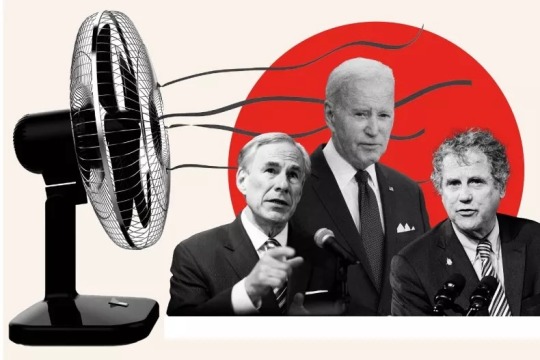
A Newsweek photo graphic showing, from left, Texas Gov. Greg Abbott, Joe Biden and U.S. Senator Sherrod Brown. Newsweek; Source Photo; Brandon Bell/Getty; Alessandro Rampazzo/AFP Via Getty; Angelo Merendino/Getty Images
American workers are dying, local businesses are reporting a drop in productivity, and the country's economy is losing billions all because of one problem: the heat.
July was the hottest month on record on our planet, according to scientists. This entire summer, so far, has been marked by scorching temperatures for much of the U.S. South, with the thermometer reaching triple digits in several places in Texas between June and July.
In that same period, at least two people died in the state while working under the stifling heat enveloping Texas, a 35-year-old utility lineman, and a 66-year-old USPS carrier. According to the Bureau of Labor Statistics, there were 36 work-related deaths due to environmental heat exposure in 2021, the latest data available. This was a drop from 56 deaths in 2020, and the lowest number since 2017.
"Workers who are exposed to extreme heat or work in hot environments may be at risk of heat stress," Kathleen Conley, a spokesperson for the Centers for Disease Control and Prevention (CDC), told Newsweek. "Heat stress can result in heat stroke, heat exhaustion, heat cramps, or heat rashes. Heat can also increase the risk of injuries in workers as it may result in sweaty palms, fogged-up safety glasses, and dizziness. Burns may also occur as a result of accidental contact with hot surfaces or steam."
While there is a minimum working temperature in the U.S., there's no maximum working temperature set by law at a federal level. The CDC makes recommendations for employers to avoid heat stress in the workplace, but these are not legally binding requirements.
The Biden administration has tasked the Occupational Safety and Health Administration (OSHA) with updating its worker safety policies in light of the extreme heat. But the federal standards could take years to develop—leaving the issue in the hands of individual states.
Things aren't moving nearly as fast as the emergency would require—and it's the politics around the way we look at work, the labor market, and the rights of workers in the U.S. that is slowing things down.
A Deep Political Divide
"There's remarkably little in terms of regulation, and of course, given our divided political views in this country—on the right, Republicans in general, are trying to resist more regulation that's premised on continuing global warming," Gregory DeFreitas, Professor of Economics and Director of the Center for the Study of Labor and Democracy at Hofstra University, New York, told Newsweek.
There's a bill, initially introduced in 2019 and now revived by Senator Sherrod Brown of Ohio, a Democrat, that would move in the direction of setting a federal standard for temperature levels, and other heat-related requirements.
The Heat Illness and Fatality Prevention Act would create a universal heat standard requirement through OSHA for workers threatened by hot working conditions.
"No worker should have to endure life-threatening heat to provide for their family. This would be an important step to protect Ohio workers on the job," said Brown in a statement available on his website. "We know too many workers still work in dangerous conditions, putting their health and safety on the line every day to provide for their families. There's not much dignity in a job where you fear for your health or your life."
Newsweek has contacted Brown for comment by phone but did not receive a response.
"Given the political divisions, it's hard to say what its chances of passage are, although you'd think that another record-setting year in heat would put more pressure on taking similar action," DeFreitas said.
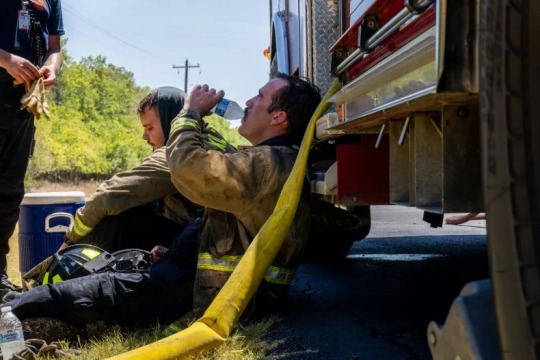
Members of the Hays County Emergency Service Districts and the Kyle and Buda Fire Departments rest together while combatting a wildfire during an excessive heat warning on August 08, 2023 in Hays County, Texas. Brandon Bell/Getty Images
This political division over safety regulations in the workplace, according to DeFreitas, started during Donald Trump's presidency. "The minute Trump got in office, he declared war on regulations," he said. "In 2017, he cut OSHA's job safety rules, employers were not required to make as frequent accident reports, there were to be no surprise inspections of factories and workplaces," he said.
"As a result what you have is a weakened federal agency, but that fits with the idea of deregulating businesses and giving them more freedom—the so-called voluntary self-regulation, which was common under both the Bush and the Trump administration."
He added: "That's a deep philosophical orientation of the current Republican Party, regardless of what the dangers are, whether it is climate change or anything else, they want to cut as much regulation and regulatory steps as they can." Newsweek contacted OSHA but did not receive a prompt response.
Billions Up in Smoke
As well as harming or losing people, the country is losing money to the heat.
According to a recent study by the Adrienne-Arsht Rockefeller Foundation Resilience Center, housed at the Atlantic Council, the U.S. is already losing approximately $100 billion on average every year from the drop in labor productivity caused by the current level of heat.
That's "approximately the annual budget for the Department of Homeland Security ($51.7 billion) and the Department of Housing and Urban Development ($44.1 billion) combined (U.S. Government Publishing Office 2019)," researchers write.
The study estimates that, if no significant effort is made to reduce emissions or adapt to extreme heat, labor productivity losses could double to nearly $200 billion by 2030 and reach $500 billion by 2050.
For labor experts, there's no doubt that the extreme heat, which is becoming more frequent due to climate change and our collective failure to bring down carbon emissions on a global level, calls for drastic changes in the way Americans work.
"It's a huge but under-appreciated issue that we're dealing with, not just with outdoor workers, but also oil and gas field workers, people working in warehouses, construction workers," Kurt Shickman, director of Extreme Heat Initiatives at the Adrienne Arsht-Rockefeller Foundation Resilience Center, told Newsweek. "It's a huge swath of our economy that's already increasingly affected by the heat today."
When it's really hot outside, people work more slowly and they are more prone to make mistakes and have accidents, said Shickman. "You may have situations where the weather is so dangerous that you just physically can't have people outside, so you lose work hours," he added.
"We're going to need all kinds of dramatic changes in terms of factory design, warehouse design, and workplace design," said DeFreitas. "The bill is going to be very, very high unless we do something dramatic soon."
Shickman thinks that change is going to depend on regulation. "I don't think we can count on this being self-policed by businesses. It hasn't been so far."
A State-Level Battle
In the immediate future, protecting workers from heat stress—when it's so hot that the body can't keep its ideal internal temperature and can suffer heat stroke and exhaustion—is then up to state lawmakers and the businesses themselves.
California, for example, has set a maximum temperature at which outdoor workers can safely do their job, as well as introducing other regulations aimed at protecting employees, like more frequent periods in the shade and water breaks. More action has been taken in this direction in a handful of states including Minnesota, Washington, Oregon, and New York.
But while states like California have succeeded in introducing effective safety regulations, in other states similar attempts have been rebuffed by the opposition of industry groups and lobbyists.
In Texas, Republican Governor Greg Abbott recently approved a law rescinding city and county ordinances requiring mandatory water breaks for construction workers—a move that generated much controversy and backlash from Texas Democrats. Supporters of the bill, on the other hand, said the law will help rein in local and county officials that have exceeded their authority and will give small businesses the consistency they need to invest and grow.
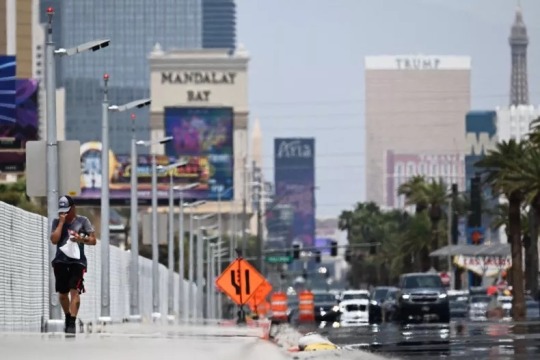
Heat waves cause distortion on the horizon as a pedestrian walks along South Las Vegas Blvd in Las Vegas, Nevada, on July 30, 2023, as temperatures reach more than 100 degrees Fahrenheit. Patrick T. Fallon/AFP Via Getty Images
In Nevada, lawmakers for months have put off giving final approval to heat safety regulations adopted by OSHA, as the state's Department of Business and Industry discusses the concerns of industry groups over the new policies, as reported by The Washington Post.
"With our workers outside during extreme heat, requiring basic water and rest breaks is just common sense—and it will save lives," Nevada Senator Catherine Cortez Masto, a Democrat, told Newsweek. "As we continue to experience record heat waves, we need to hold employers accountable and protect workers across the country."
The Cost of Change
Investing in making the workplace safer for employees might cost companies more than they're willing to spend, even as they are losing workers' productivity and hours.
"A lot of the generalized skilled work, what we would call lower skilled work, is in warehouses," Lindsey Cameron, an assistant professor of management at the Wharton School, University of Pennsylvania, told Newsweek. "Warehouses are big, massive football fields. It costs a lot of money and a lot of infrastructure to try to cool down. And sometimes it's just impossible because you have all these trucks going in and out and people going in and out."
Some businesses have already moved to protect their workers from heat, knowing that the cost of ignoring the issue could eventually be higher than trying to fix it.

A construction worker moves materials as people sit and drink water along the steps of the Lincoln Memorial in Washington, DC, on July 27, 2023, as temperatures are expected to reach record highs. Brenden Smialowski/AFP Via Getty Images
Jose Garza, the national environmental health and safety leader at California-headquartered general contractor DPR Construction, told Newsweek that the company—which has over 10,000 employees—has implemented heat safety procedures that go beyond the state-mandated regulation, including introducing cooling stations, handing out electrolyte drinks, and giving more breaks to workers.
"We see it as the cost of taking care of people and the right thing to do," he said. "You can either plan for it or react to it, because if you're not planning for it, those breaks are going to happen when the worker is no longer able to work, when they're sick, when they're well beyond the point where their bodies are unable to cool themselves down."
Garza said that employers who care about their workers should go "above and beyond" available regulation to protect them from heat.
'A Long Time' Coming
Experts agree that change won't come from the businesses—and will likely not come soon unless there's committed political action.
"It's really going to take both state and federal movement on this," DeFreitas said. "And I'm hoping that certainly in states like New York, where there does seem to be more attention to workplace safety, that they can move in the direction of the federal bill that's now stuck in progress."
"I don't think the United States has such a great backbone when it comes to climate issues," said Cameron. "We pulled out of the Paris Agreement [under former President Trump in 2017, but rejoined in 2021 under President Joe Biden]. I think there's going to be a lot more attention given to climate change, but it may take a long time to be able to see those changes."
#Newsweek#Too Hot Climate#America’s 🇺🇸 Next Big Labor Battle#Giulia Carbonaro#Scortching Heat#U.S. South#Texas#Bureau of Labor Statistics#Kathleen Conley#Centers For Disease Control and Prevention (CDC)#Occupational Safety and Health Administration (OSHA)#Political Divisions#Republicans#Gregory DeFreitas#Study of Labor and Democracy at Hofstra University | New York#Senator Sherrod Brown of Ohio (D)#The Heat Illness and Fatality Prevention Act#Adrienne-Arsht Rockefeller Foundation Resilience Center#Department of Homeland Security#Department of Housing and Urban Development#Kurt Shickman#Minnesota | Washington | Oregon | New York#Texas Governor Greg Abbott (R)#Nevada#The Washington Post#Nevada Senator Catherine Cortez Masto (D)
0 notes
Text
New DOL Salary Threshold for Most White-Collar Exemptions Is Now in Effect
Update July 1, 2024: The U.S. Department of Labor’s new rule on the required salary threshold for employees to qualify as exempt from overtime is now in effect as of July 1, 2024. Although the federal district court for the Eastern District of Texas issued an injunction blocking enforcement of the new rule against the State of Texas as an employer on Friday, June 28, 2024, that injunction does…
#business#Employment Law#Fair Labor Standards Act#government#labor and employment#legal#Overtime Eligibility#overtime salary threshold#U.S. Department of Labor
0 notes
Text
New York lawmakers proposed three new bills last week that would make it difficult for wage theft violators to conduct business in the state. The legislation would bolster the power of state agencies to crack down on wage theft by stripping violators of their liquor licenses or business licenses, as well as issuing stop-work orders against them. The legislation was prompted by reports of rampant wage theft against New York workers, including two investigations published by Documented and ProPublica. The stories revealed that more than 127,000 New Yorkers have been victims of wage theft during a recent five-year period, but that the New York State Department of Labor was unable to recover $79 million in back wages owed to the workers. The stories were based on an analysis of two databases of wage theft violations obtained from the U.S. and New York Labor departments. The databases provided previously unreported details on how much money had been stolen from workers and also shed light on which businesses had committed wage theft. “We knew from our conversations with labor and from our constituent service caseload that wage theft is a chronic problem,” said Sen. Jessica Ramos, a Democrat who sponsored the legislation. “We did not have the data to understand the scale of the issue in New York state until the ProPublica and Documented series came out last year. Having this reporting as a tool set us up to put this package together and focused our attention on” the capacity of the Department of Labor. The legislation — dubbed the “wage theft deterrence package” by lawmakers — includes three bills, which are co-sponsored in the State Assembly by Assembly members Kenny Burgos, Harvey Epstein and Linda Rosenthal.
4K notes
·
View notes
Text



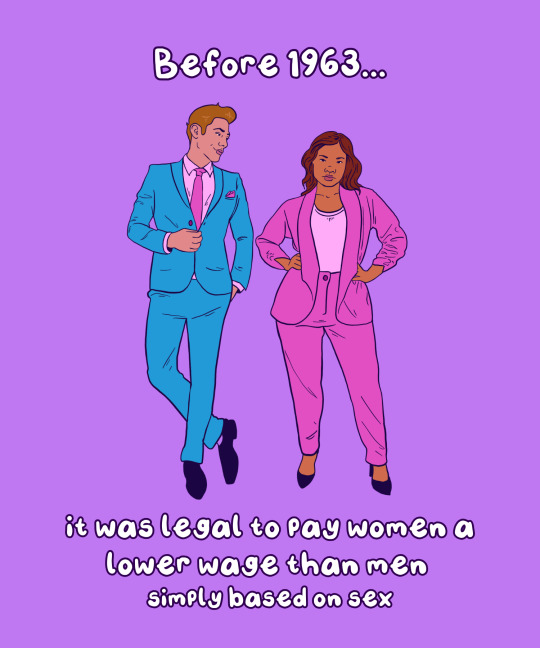







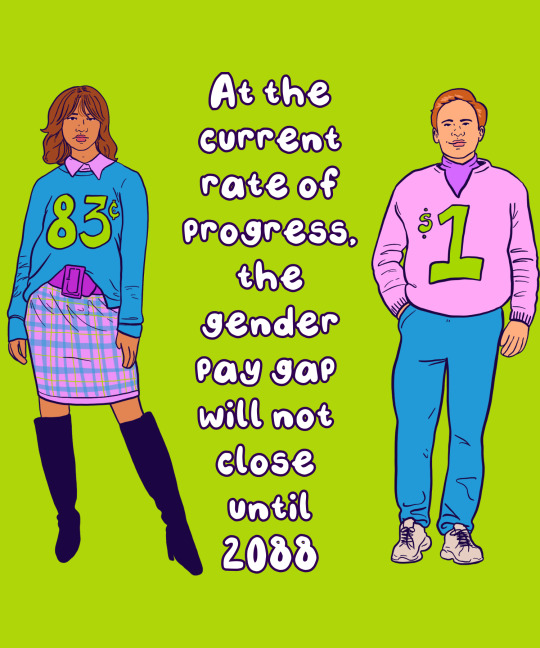
🧵 THREAD: This #EqualPayDay, let’s not forget how many of our workplace rights were only secured in the last few decades.
💪✨ We need to fight for our rights.
Here’s are a few examples:
📍 In 1963, the Equal Pay Act required employers to provide equal pay for equal work regardless of gender.
📍 In 1964, the Civil Rights Act prohibited discrimination based on gender, race, religion, color, or national origin in public places, schools, and employment. Before, it was legal to refuse employment opportunities to women.
📍 In 1978, the Pregnancy Discrimination Act made it illegal for employers to discriminate against pregnancy, childbirth, or related medical conditions.
📍 In 1988, the Women's Business Ownership Act created support for women business owners and eliminated the requirement for male co-signers on loans.
📍 In 1993, the Family and Medical Leave Act gave some workers paid family leave, and provided job protection and security for employees who took unpaid time off to care for a relative or family member.
📍 In 2010, the PUMP Act expanded the Break Time law, which provides key workplace protections for nursing mothers, including reasonable break time to nurse and a private place to pump.
📍 In 2020, the U.S. Supreme Court held that an employer who fires or otherwise discriminates against an individual simply for being gay or transgender is in violation of Title VII of the Civil Rights Act of 1964.
📍 In 2024, the Department of Labor introduced a Final Rule to end an employer's ability to pay individuals with disabilities subminimum wages.
Alt-text included on all pieces.
#equal pay day#equal pay#pay gap#pay inequity#pay inequality#economic justice#capitalism#women at work#women's rights#graphics#educational
595 notes
·
View notes
Text
WASHINGTON ― More than 5,000 people got their jobs back at the U.S. Department of Agriculture this month after a government employee oversight board concluded they had been illegally fired by Elon Musk’s Department of Government Efficiency.
The decision by that panel, the Merit Systems Protection Board, came after it restored the jobs of six other federal employees who had been similarly fired by DOGE.
Meanwhile, this month, a federal judge blocked DOGE from firing the president of a small federal agency, the U.S. African Development Foundation, in a lawsuit that provides the clearest details yet on how DOGE operates and how it may be routinely breaking the law.
All of these legal challenges came from the same group, a well-funded progressive legal organization, Democracy Forward.
At a time when the flood of litigation against President Donald Trump’s early actions is nearly impossible to keep up with ― his administration has already been hit with more than 130 legal challenges in the span of two months ― Democracy Forward has emerged as a leading legal organization that’s been slowing, if not stopping, some of Trump’s recklessness through the courts.
The group doesn’t just stand out for the number of lawsuits it’s been filing, which include more than 28 legal actions and 67 investigations since Trump was sworn in. Democracy Forward has shown it can move quickly to step in amid Trump’s chaotic, and often illegal, efforts to dismantle entire agencies, freeze federal spending, and fire thousands of federal employees. It has intervened on behalf of individual people, unions, nonprofit groups, health care professionals, educators, veterans groups and religious groups.
And importantly, it’s been winning.
On Saturday, Democracy Forward and the American Civil Liberties Union challenged Trump’s expansion of war time powers to deport immigrants using the centuries-old Alien Enemies Act. Within hours, a federal judge issued a temporary restraining order preventing Trump from removing some people through this act ― and later that day, broadened the scope of his order to cover all immigrants in danger of removal under the act.
In another case brought by Democracy Forward, a federal judge last week reaffirmed the court’s nationwide preliminary injunction (i.e., a temporary court order to preserve the status quo) that halted Trump’s efforts to arbitrarily terminate federal grants relating to diversity, equity and inclusion, and accessibility programs. The judge reaffirmed that not only can Trump not do that, but that this temporary halt applies to all agencies in the executive branch.
The group also secured the first and only nationwide order preventing Trump from imposing a sweeping freeze on trillions of dollars in federal spending, blocked a Trump administration policy enabling immigration enforcement officers to indiscriminately raid houses of worship, and this week prompted a federal judge to slam the Trump administration’s defense of DOGE and grant a request by labor and economic organizations to get more details about the Elon Musk-led entity unlawfully accessing sensitive data at federal agencies.
The evidence the Trump administration put forward to avoid more transparency into DOGE’s operations “is not the panacea they hoped it would be,” this judge concluded.
A big reason this organization has been so adept at countering Trump in court is because it spent the last 18 months gaming out legal strategies for responding to countless policy plans laid out in Project 2025, the far-right policy blueprint that the Heritage Foundation put together in preparation for a second Trump presidency.
Democracy Forward staff indexed the entire 900-page policy playbook, broke it down into different categories, put it in a spreadsheet and meticulously laid out what legal actions they should prepare to take based on how the Trump administration was likely to proceed with various policies, whether it be through executive orders, statutes or regulations.
They also coordinated with more than 450 civil society groups and state attorneys general to prepare for different scenarios where certain groups would be impacted by Project 2025 policies, and figured out when they should team up to defend the rule of law.
Trump tried to distance himself from Project 2025 on the campaign trail because lots of its plans are extreme and unpopular. But the policy guidebook was put together by former Trump administration officials and staunch allies, so it’s not surprising to see the president now moving aggressively to enact some of its proposals, like purging tens of thousands of federal workers for political reasons or abolishing the Department of Education.
In fact, late Thursday, Trump signed an executive order to dismantle the education department. Minutes later, Democracy Forward announced it would see him in court.
“Trump’s playbook is a known playbook,” Skye Perryman, Democracy Forward’s president and CEO, told HuffPost in an interview. “The Heritage Foundation wrote it down: Project 2025. We never believed it was a talking point or hyperbole. It is the greatest threat to democracy since the Civil War.”
Democracy Forward also prepared for a second Trump presidency by gathering materials from his first administration to review what legal actions and litigation he previously pursued, whether they be related to his executive orders, immigration cases, impoundment or challenges to executive orders issued by former President Joe Biden.
The president has done some unexpected things in his second term, like tapping Musk to oversee DOGE and letting him gain access to millions of Americans’ personal data. But Perryman said her organization was primed to respond to something chaotic, and in the case of DOGE, they sued on day one.
“This is like basic stuff,” she said.
“They do not play within the rules. There is opportunity in their lawlessness,” Perryman said. “They make a lot of legal foibles.”
Democracy Forward currently represents the American Federation of Teachers in two lawsuits, one that aims to halt DOGE’s seizure of millions of people’s sensitive data from the Social Security Administration, and another challenging a new Department of Education policy threatening to withhold federal money from schools teaching accurate history about slavery and diversity.
AFT, which has more than 1.8 million members, had been preparing to fight Trump’s executive order to dissolve the Department of Education when the department unexpectedly announced a new policy of stripping federal funds from schools that support diversity, equity and inclusion initiatives, said Daniel McNeil, general counsel at AFT. So the teachers’ group asked Democracy Forward if they wanted to team up to fight that, too.
“They already had something ready to go,” McNeil said. “It took working through the entire weekend to get it done, but they weren’t fazed at all by the fact that something else happened.”
AFT is working with other legal groups suing the Trump administration, he said, and they’re also doing good work. What’s unique about Democracy Forward’s model, though, is that they have their own attorneys doing the litigating versus hiring outside firms, and they have experts on staff, like someone who previously worked in the general counsel’s office at the Department of Education. They’ve also just been anticipating specific legal fights, he said.
“Of all the groups that were warning about Project 2025, they were systematically planning for the legal fight in the event that Trump were elected,” said McNeil. “For months in advance, they were thinking in a way that was like, ‘How do we challenge an executive order that does X? Who is the right party to challenge if Y happens?’ I think that’s what makes them different.”
Democracy Forward first launched in 2017, in response to what it described as the first Trump administration’s “unprecedented” threats to democracy and the rule of law. By 2019, it had sued his administration more than 100 times and chalked up several wins, including forcing the administration to collect pay data from employers based on race, gender and ethnicity, and forcing the FDA to regulate e-cigarettes.
Both Democracy Forward and its nonprofit counterpart, Democracy Forward Foundation, are chaired by Marc Elias, who served as general counsel for Hillary Clinton’s 2016 presidential campaign. The nonprofit is funded entirely by individual donors and philanthropic institutions. Its major donors include the Sandler Foundation, which gave $16 million from 2018 to 2023, and the Susan Thompson Buffett Foundation, which gave $5.6 million from 2021 to 2023.
Democracy Forward was operating with a budget of about $12.4 million in 2023, the most recent year its tax filings are available.
The organization has been hiring up for Trump’s second term. Last month, it brought on more litigators, public affairs specialists and operations personnel ― several of whom are seasoned former federal staffers from agencies that Democracy Forward will likely be seeing in court amid its lawsuits against the Trump administration, including the Justice Department, the Department of Health and Human Services, and the Interior Department.
One of its newest hires, Joel McElvain, was the acting deputy general counsel at HHS, where he was responsible for legal advice on all matters relating to Medicare and Medicaid statutes and the Affordable Care Act. Another recent hire, Michael Waldman, was special counsel at the Department of Veterans Affairs, where he advised the secretary on oversight matters and managed the department’s responses to congressional inquiries.
Shawn Phetteplace of Main Street Alliance, a network of roughly 30,000 small business owners that support left-of-center policies, has worked with Democracy Forward for years and is currently represented by them in three cases against the Trump administration. One case relates to the Office of Management and Budget’s freeze on billions of dollars on Jan. 27 in congressional approved federal grants being disbursed.
This funding freeze resulted in multiple small business owners having their money cut off, to the point where they weren’t sure if they could continue to operate, said Phetteplace. Within hours of OMB announcing its new directive, Democracy Forward requested a temporary restraining order in federal court. A judge granted that order on Feb. 3, and by Feb. 25, the judge granted a preliminary injunction, blocking the nationwide freeze from taking effect, for now.
“They keep winning,” Phetteplace said of Democracy Forward. “For our members, this isn’t theoretical. This is whether or not they stay in business.”
He chalks up some of the group’s success to the public-facing push it makes on the cases it’s fighting. He gave the example of Main Street Alliance members reaching out to the group to talk about how their businesses were hurt by Trump’s policies, and then how litigation has helped them. Democracy Forward has been incorporating those stories into its public statements as it moves forward with various lawsuits.
“They understand that it is really important to shape the public narrative around the issue and educate the public about the stakes,” he said. “That helps them make a stronger case.”
To be sure, Democracy Forward has faced setbacks in stemming Trump’s chaos, and that’s due to at least some of its victories being temporary. Last month, it filed emergency litigation in response to Trump’s plans to unilaterally defund the Consumer Financial Protection Bureau, a financial watchdog agency. Their quick legal action resulted in the administration backing off its plans, instead agreeing to wait until a related case was heard in court.
A federal judge has since heard that case ― and this week denied the plaintiffs’ request to halt the administration’s plans for CFPB.
Temporary wins are still wins. When a judge issues a temporary restraining order or a preliminary injunction, it immediately blocks an action and buys time. Preliminary injunctions in particular can drag on for a long time. Democracy Forward and other groups have already demonstrated that collectively taking these legal steps has a real effect on slowing Trump’s unlawful, everywhere-all-at-once approach to dismantling the federal government.
Democracy Forward chalked up another temporary, but significant, victory in one of its cases late on Thursday: A federal judge blocked DOGE workers from accessing Social Security systems, calling the Musk-led efforts at this agency a “fishing expedition.”
“This is a major win for working people and retirees across the country,” said Lee Saunders, president of the American Federation of State, County, and Municipal Employees, one of the plaintiffs in the case. “This decision will not only force them to delete any data they have currently saved, but it will also block them from further sharing, accessing or disclosing our Social Security information.”
Some Trump allies are mad at the success that Democracy Forward and other groups have found in the courts, particularly in cases where judges have issued nationwide injunctions halting some of the president’s actions. In a nonsensical show of fealty to Trump, Sen. Josh Hawley (R-Mo.) on Thursday vowed to introduce legislation to prevent U.S. district court judges from issuing nationwide injunctions ― something that is, in fact, their jobs.
“That is not a power that I think district courts have,” Hawley, a Yale Law School alum who knows better, claimed on The Charlie Kirk Show, a far-right podcast. “Either the Supreme Court needs to intervene and make clear there’s only one court that can issue rules for the whole country … and/or, if they won’t do that, Congress needs to legislate and make clear that district courts do not have the ability to issue these kinds of injunctions.”
For her part, Perryman said one reason it’s important to slow things down in the courts is because it creates transparency on what Trump is actually doing. Doing so gives Americans a better understanding of the illegality of his actions, she said, and forces his administration to keep answering for what it’s doing.
“Understand that chaos is part of the strategy,” she said.
“Every day in litigation, what we see in this administration is they back off,” Perryman added. “Because really, the purpose is to see what they can do quickly. They don’t hold great conviction. There is opportunity in that.”
398 notes
·
View notes